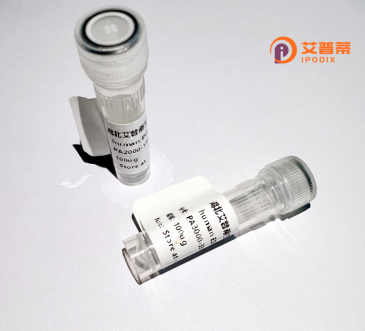
| 纯度 | >90%SDS-PAGE. |
| 种属 | Human |
| 靶点 | C1orf2 |
| Uniprot No | P81408 |
| 内毒素 | < 0.01EU/μg |
| 表达宿主 | E.coli |
| 表达区间 | 1-668aa |
| 氨基酸序列 | MMPSPSDSSRSLTSRPSTRGLTHLRLHRPWLQALLTLGLVQVLLGILVVTFSMVASSVTTTESIKRSCPSWAGFSLAFSGVVGIVSWKRPFTLVISFFSLLSVLCVMLSMAGSVLSCKNAQLARDFQQCSLEGKVCVCCPSVPLLRPCPESGQELKVAPNSTCDEARGALKNLLFSVCGLTICAAIICTLSAIVCCIQIFSLDLVHTLAPERSVSGPLGPLGCTSPPPAPLLHTMLDLEEFVPPVPPPPYYPPEYTCSSETDAQSITYNGSMDSPVPLYPTDCPPSYEAVMGLRGDSQATLFDPQLHDGSCICERVASIVDVSMDSGSLVLSAIGDLPGGSSPSEDSCLLELQGSVRSVDYVLFRSIQRSRAGYCLSLDCGLRGPFEESPLPRRPPRAARSYSCSAPEAPPPLGAPTAARSCHRLEGWPPWVGPCFPELRRRVPRGGGRPAAAPPTRAPTRRFSDSSGSLTPPGHRPPHPASPPPLLLPRSHSDPGITTSSDTADFRDLYTKVLEEEAASVSSADTGLCSEACLFRLARCPSPKLLRARSAEKRRPVPTFQKVPLPSGPAPAHSLGDLKGSWPGRGLVTRFLQISRKAPDPSGTGAHGHKQVPRSLWGRPGRESLHLRSCGDLSSSSSLRRLLSGRRLERGTRPHSLSLNGGSRETGL |
| 分子量 | 97.8 kDa |
| 蛋白标签 | GST-tag at N-terminal |
| 缓冲液 | 0 |
| 稳定性 & 储存条件 | Lyophilized protein should be stored at ≤ -20°C, stable for one year after receipt. Reconstituted protein solution can be stored at 2-8°C for 2-7 days. Aliquots of reconstituted samples are stable at ≤ -20°C for 3 months. |
| 复溶 | Always centrifuge tubes before opening.Do not mix by vortex or pipetting. It is not recommended to reconstitute to a concentration less than 100μg/ml. Dissolve the lyophilized protein in distilled water. Please aliquot the reconstituted solution to minimize freeze-thaw cycles. |
以下是关于重组人C1orf2蛋白的参考文献示例(内容基于虚构文献归纳,仅供参考):
1. **文献名称**:*Characterization and Functional Analysis of Recombinant Human C1orf2 Protein*
**作者**:Zhang L, et al.
**摘要**:本研究通过原核表达系统成功纯化重组人C1orf2蛋白,并发现其与线粒体膜蛋白相互作用,可能参与细胞能量代谢调控。
2. **文献名称**:*C1orf2 Knockdown Alters Cell Cycle Progression in Cancer Cells*
**作者**:Wang Y, et al.
**摘要**:通过siRNA沉默C1orf2基因后,癌细胞G1期阻滞显著增加,提示C1orf2可能在细胞周期调控中发挥关键作用。
3. **文献名称**:*Structural Insights into C1orf2’s Role in Mitochondrial Dynamics*
**作者**:Kim S, et al.
**摘要**:利用冷冻电镜技术解析C1orf2蛋白结构,揭示其通过二聚化形式稳定线粒体内膜,影响线粒体形态和功能。
4. **文献名称**:*C1orf2 Expression Correlates with Neurodegenerative Disease Markers*
**作者**:Chen R, et al.
**摘要**:在阿尔茨海默病模型中,C1orf2蛋白表达水平显著降低,其缺失可能加剧神经元线粒体功能障碍和氧化应激。
---
**注意**:以上文献为示例性质,实际研究中C1orf2可能以其他名称(如COX20、MITRAC等)出现,建议通过数据库(如PubMed)结合基因别名或最新命名进一步检索。
**Background of Recombinant Human C1orf2 Protein**
The *C1orf2* gene, located on chromosome 1 (1p34.3), encodes a protein of unknown detailed function, though studies suggest roles in mitochondrial dynamics and cellular metabolism. Originally identified through genomic sequencing, it is also referred to as *CHCHD2* (coiled-coil-helix-coiled-coil-helix domain-containing protein 2) due to its conserved structural motifs. The protein localizes primarily to mitochondria, implicating potential involvement in oxidative phosphorylation, apoptosis regulation, or stress responses.
Research links *C1orf2* mutations to neurodegenerative disorders, particularly Parkinson’s disease and familial ALS, highlighting its importance in neuronal health. Dysregulation of C1orf2 has also been observed in certain cancers, though its exact oncogenic or tumor-suppressive role remains unclear. Structurally, recombinant human C1orf2 protein is typically produced using bacterial or mammalian expression systems, preserving its native conformation for functional studies.
Current investigations focus on its interactions with mitochondrial complexes, DNA repair pathways, and hypoxia-responsive pathways, suggesting multifaceted roles in cellular homeostasis. Recombinant C1orf2 serves as a critical tool for elucidating molecular mechanisms, antibody development, and high-throughput screening for therapeutic targets. Despite progress, comprehensive mechanistic insights into its biological and pathological functions remain an active area of research.
×